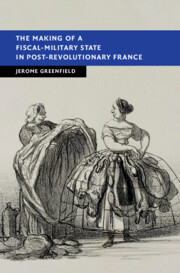Book contents
- The Making of a Fiscal-Military State in Post-Revolutionary France
- New Studies in European History
- The Making of a Fiscal-Military State in Post-Revolutionary France
- Copyright page
- Contents
- Figures and Tables
- Acknowledgements
- Abbreviations
- Chapter 1 The Nineteenth-Century French State and Its Rivals
- Chapter 2 The Revolutionary Quest for Fiscal Stability, 1789–1799
- Chapter 3 Developing a Post-Revolutionary Fiscal Politics, 1799–1814
- Chapter 4 Recasting the Fiscal-Military System, 1814–1821
- Chapter 5 The Resurgence of French Power, 1821–1830
- Chapter 6 The 1830 Revolution and the Limits of Fiscal Reform
- Chapter 7 The Ascent of the Interventionist Orleanist State, 1830–1848
- Chapter 8 The Rise and Fall of Austerity, 1848–1856
- Chapter 9 Reaching the Limits of the Fiscal-Military System, 1856–1871
- Chapter 10 The Triumph of the Notables
- References
- Index
Chapter 5 - The Resurgence of French Power, 1821–1830
Published online by Cambridge University Press: 25 August 2022
- The Making of a Fiscal-Military State in Post-Revolutionary France
- New Studies in European History
- The Making of a Fiscal-Military State in Post-Revolutionary France
- Copyright page
- Contents
- Figures and Tables
- Acknowledgements
- Abbreviations
- Chapter 1 The Nineteenth-Century French State and Its Rivals
- Chapter 2 The Revolutionary Quest for Fiscal Stability, 1789–1799
- Chapter 3 Developing a Post-Revolutionary Fiscal Politics, 1799–1814
- Chapter 4 Recasting the Fiscal-Military System, 1814–1821
- Chapter 5 The Resurgence of French Power, 1821–1830
- Chapter 6 The 1830 Revolution and the Limits of Fiscal Reform
- Chapter 7 The Ascent of the Interventionist Orleanist State, 1830–1848
- Chapter 8 The Rise and Fall of Austerity, 1848–1856
- Chapter 9 Reaching the Limits of the Fiscal-Military System, 1856–1871
- Chapter 10 The Triumph of the Notables
- References
- Index
Summary
Restored at the allies’ behest in 1814 and 1815, the Bourbons felt considerable pressure to bolster their legitimacy by asserting their nationalist credentials. Consequently, in the 1820s the French exploited the possibilities of public credit to finance a highly aggressive foreign policy, intervening in Spain in 1823, Greece in 1827–9 and Algeria in 1830. Thus, Restoration France became a quintessential fiscal-military state on the model of eighteenth-century Britain. Moreover, the growing French reliance on public credit stimulated the rise of the Paris Bourse as a major international financial centre. French governments thereby gained a new diplomatic tool that facilitated foreign government loans in Paris. The restored Bourbons also sought to use public credit to reinforce the regime by ‘closing the last wound of the Revolution’, compensating those who had lost property following the Revolution through the proceeds of a debt conversion. However, his idea proved highly controversial – though less because it would compensate formerly exiled aristocrats than because it would reduce the income of small rentiers and civic institutions with endowments invested in rentes.
Keywords
- Type
- Chapter
- Information
- Publisher: Cambridge University PressPrint publication year: 2022

